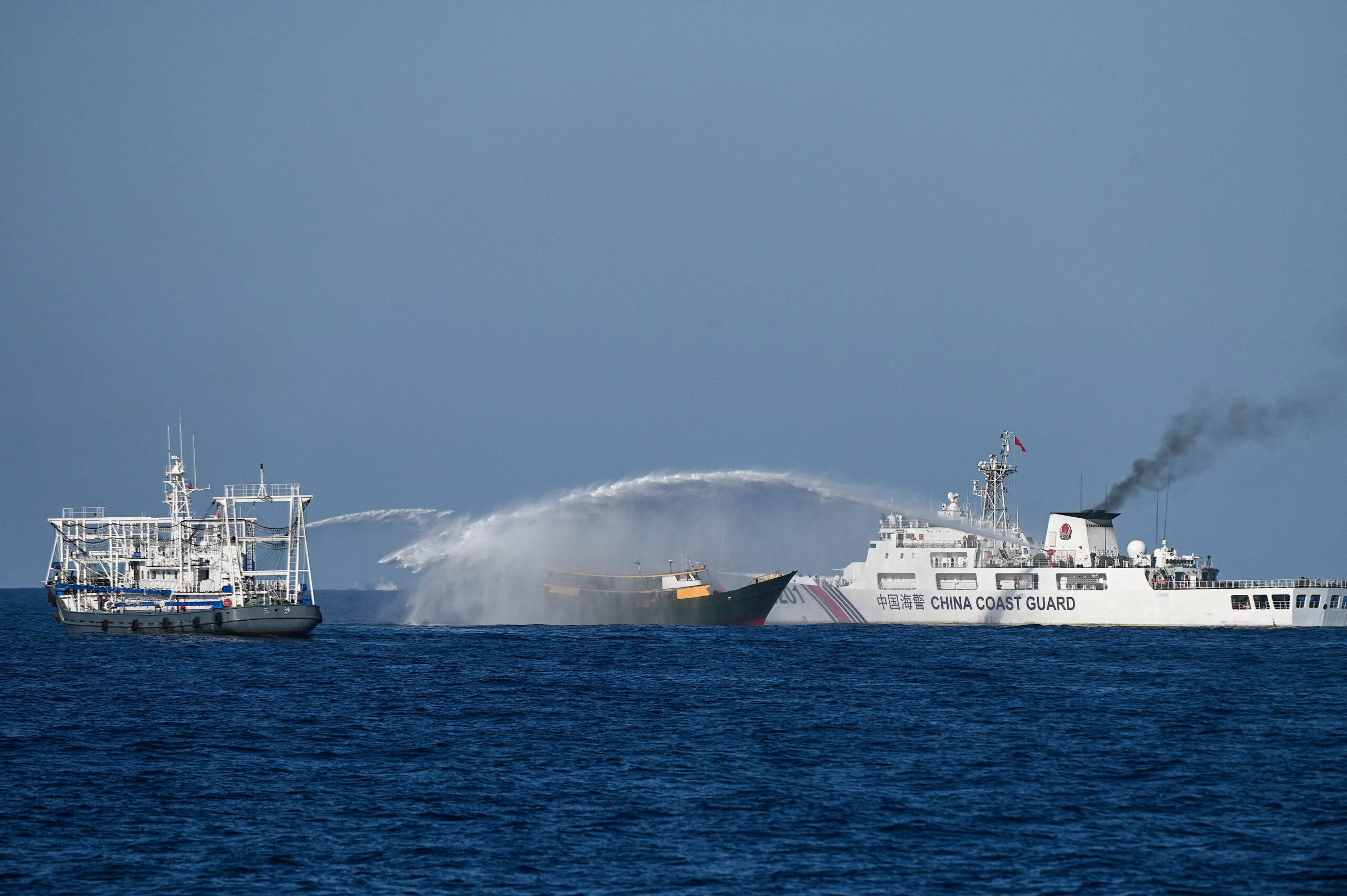
This photo taken on March 5, 2024 shows China Coast Guard vessels deploying water cannons at the Philippine military chartered Unaizah May 4 (C) during its supply mission to Second Thomas Shoal in the disputed South China Sea. The Philippines said on March 5 that China Coast Guard vessels caused two collisions with Philippine boats and water cannoned one of them, leaving four crew injured during a resupply mission in the South China Sea. (Photo by JAM STA ROSA / AFP)
MANILA, Philippines — Speaker Ferdinand Martin Romualdez has agreed with President Ferdinand Marcos Jr.’s call for the swift conclusion of talks on the South China Sea (SCS) code of conduct to ensure security and stability in the area.
Romualdez said this after Marcos aired concerns over China’s aggressive actions in the SCS, as shown by the Chinese Coast Guard’s harassment of Philippine vessels and aircraft, even if these operate within the Philippines’ exclusive economic zone.
“The swift finalization of the code of conduct is essential in the pursuit of a peaceful resolution to the disputes in the South China Sea, managing tensions, and preventing future conflicts,” Romualdez said in a statement on Thursday.
“The House of Representatives stands solidly behind President Marcos in his steadfast efforts to secure a common ground for all stakeholders towards greater cooperation and security in the South China Sea,” he added.
Reports showed that Marcos challenged Chinese Premier Li Qiang over recent incidents in the West Philippine Sea (WPS), a part of the SCS that China has been claiming, during the Association of Southeast Asian Nations (Asean) summit in Laos.
A Southeast Asian diplomat who attended the meeting told reporters that Marcos raised the issue during the meeting with Li, arguing that “you cannot separate economic cooperation from political security.”
Marcos also stepped up the ante, telling that Asean and China cannot pretend that all is well on the economic front when there are tensions on the political front.
READ: Marcos challenges China’s premier over West Philippine Sea at Asean meet
Romualdez said Marcos’ engagements in the Asean Summit directly impact Filipinos’ everyday lives.
“This summit isn’t just about foreign policy. The President is working hard to safeguard our natural resources, which directly affects our fishermen and the communities that depend on them for their livelihood,” he said.
“Looking ahead, the Philippines commits to deepening and expanding ASEAN-China relations in a comprehensive manner, thereby contributing further to the region’s long-term peace, development, and cooperation,” he added.
This is not the first time that Romualdez and Marcos stressed the need for a SCS code of conduct and calling out China for its aggressive actions in the WPS.
Last August 16, Romualdez condemned China’s continued intrusion in the WPS, saying that the China Coast Guard’s (CCG) activities are becoming “increasingly aggressive.”
He was referring to the CCG’s ramming of a Bureau of Fisheries and Aquatic Resources (BFAR) vessel near Escoda (Sabina) Shoal last August 25. Sabina Shoal is well within the Philippines’ 200 nautical mile exclusive economic zone.
A video taken by the Philippine Daily Inquirer showed CCG Ship 21551 hitting BRP Datu Sanday while some of its personnel were seen filming the incident around 10 nautical miles off Escoda Shoal.
Another video showed that the CCG ship 4102 fired a water cannon against BRP Datu Sanday while en route to the shoal. Six CCG vessels also simultaneously fired water cannons against the BFAR vessel.
READ: West PH Sea: China Coast Guard ship rams BFAR vessel near Escoda Shoal
However, China’s state broadcaster CCTV claimed that it was the Philippine vessel that “illegally intruded into the waters near Xianbin Reef in the Nansha Islands without permission from the Chinese government.”
Romualdez also noted that last August 19, CCG ships rammed two Philippine Coast Guard vessels.
READ: PH vessels rammed, harassed by China anew in West Philippine Sea – Malaya
China has been claiming key islands and areas in the WPS despite the Permanent Court of Arbitration (PCA) issuing an award that invalidated China’s nine-dash line for lack of legal basis.
Despite the intrusion, Marcos has been adamant about the Philippines is not yielding an inch of its territory while he is president.
READ: PH wins arbitration case over South China Sea

